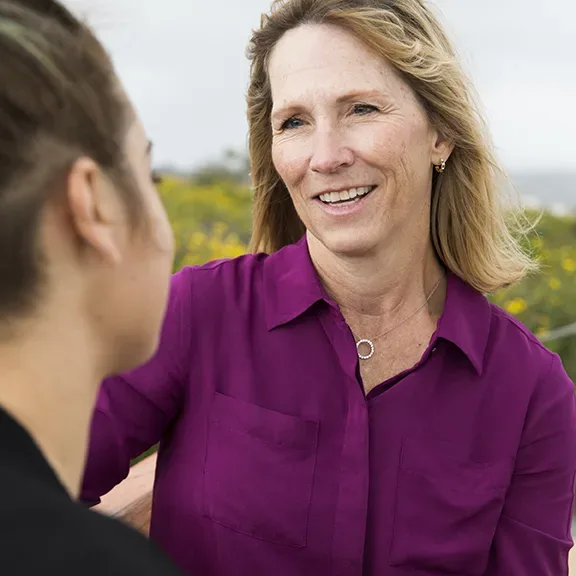The CASA Model

Children who have experienced abuse and neglect are among the most vulnerable members of our community. They also present us with some of the greatest opportunities to make a lasting impact — for their futures and for our society. At Voices for Children, we have seen time after time, case after case, the difference one caring adult can make in the life of a child.
“The single most common factor for children and teens who develop the capacity to overcome serious hardship is having at least one stable and committed relationship with a supportive parent, caregiver, or other adult.”
-Harvard’s Center on the Developing Child
Court Appointed Special Advocates (CASAs)
The role of a Court Appointed Special Advocate (CASA) was first conceived in 1977 by Judge David Soukup in Seattle, who wanted to find a way for the court to obtain better information about the needs of children in foster care. He believed dedicated and well-trained volunteers could accomplish that task, and the idea quickly spread across America, including in San Diego, where Voices for Children was founded in 1980. Today, there are nearly 1,000 nonprofit CASA programs operating in 49 states.
In San Diego and Riverside Counties, Voices for Children recruits and trains volunteers to serve as CASAs. Each CASA is appointed by a judge to get involved in the life of a child, spend time with them, and report to the court about the child’s progress and needs. Unlike the high case loads other professionals face, a CASA is able to focus on just one child or sibling group at a time. By building a trusting relationship with that child, a CASA is able to help the judge understand not only their situation but also what they like to do, what their favorite subject is in school, or why they are struggling in a certain placement. This individualized advocacy helps judges make the most informed decisions for children’s futures.
Why do children need CASA volunteers?
It is difficult to think about a child experiencing abuse or not receiving the basic needs they must have to live and be safe. Yet that is exactly why children have been removed from their homes and enter foster care. Every day, we hear stories of debilitating neglect and unimaginable abuse that no child should experience.
Learn more about child abuse and neglect.
When a child enters foster care, their world suddenly includes a new home, often a new school and classmates, social workers, lawyers, and court hearings. It is during this time that they need the support of a caring adult more than ever. While the foster care system comprises many talented and passionate professionals, it is also overburdened. Many children feel very much alone—until they meet their CASAs.
What is a Court Appointed Special Advocate (CASA)?
Consistent Presence
Children in foster care have experienced abuse and neglect. Once they enter the dependency system, their world suddenly includes court hearings, social workers, attorneys, and often new homes and schools. Amidst it all, a CASA is the one consistent, caring presence for a child.
Problem-Solver
From helping a child get glasses to ensuring their records transfer to new schools, a CASA is an expert problem-solver who makes things happen. With resources provided by Voices for Children, CASAs work alongside social workers, caregivers, attorneys, and other professionals to make sure nothing falls through the cracks.
Advocate
At regular intervals, CASAs report on children’s progress and needs. A CASA is able to help the judge understand not only the child’s needs, but also what they like to do, what their favorite color is, or why they are struggling in school. This individualized advocacy helps judges make the most informed decisions for each child’s future.
Who can become a CASA?
We have hundreds of dedicated CASAs—people of all ages and backgrounds. They work full-time, part-time, are retired, and are students. No legal experience or prior knowledge of foster care are required; we provide all the training needed to be a successful advocate. The basic requirements include:
- Must be at least 21 years old
- Must be able to visit with case child at least once per month
- Minimum commitment of 12 months; average service is 10 hours per month
- Must have a good driving record and be able to clear criminal background checks
Who do CASAs support?
A CASA’s primary focus is advocating for the best interest of the child. In doing so, CASAs often provide meaningful support to caregivers, biological families, and professionals on the case.
What types of cases do CASAs support?
At the inception of the CASA model, volunteers helped to provide the court with better information about the needs of children in the juvenile dependency system, known as foster care. For several decades, CASAs served only children in dependency.
Later, in 2015, the California legislature recognized the needs of youth in the other arm of the Juvenile Court system: delinquency. New laws were enacted permitting CASAs to support this population and Voices for Children launched its Juvenile Justice program in 2017.
Become a CASA Volunteer
Children who have experienced abuse and neglect need a voice. They need you to speak up for them.
Support Our CASA Program
Your gift will help us recruit, train, and support volunteers who advocate for the best interest of children and ensure their needs are being met.
